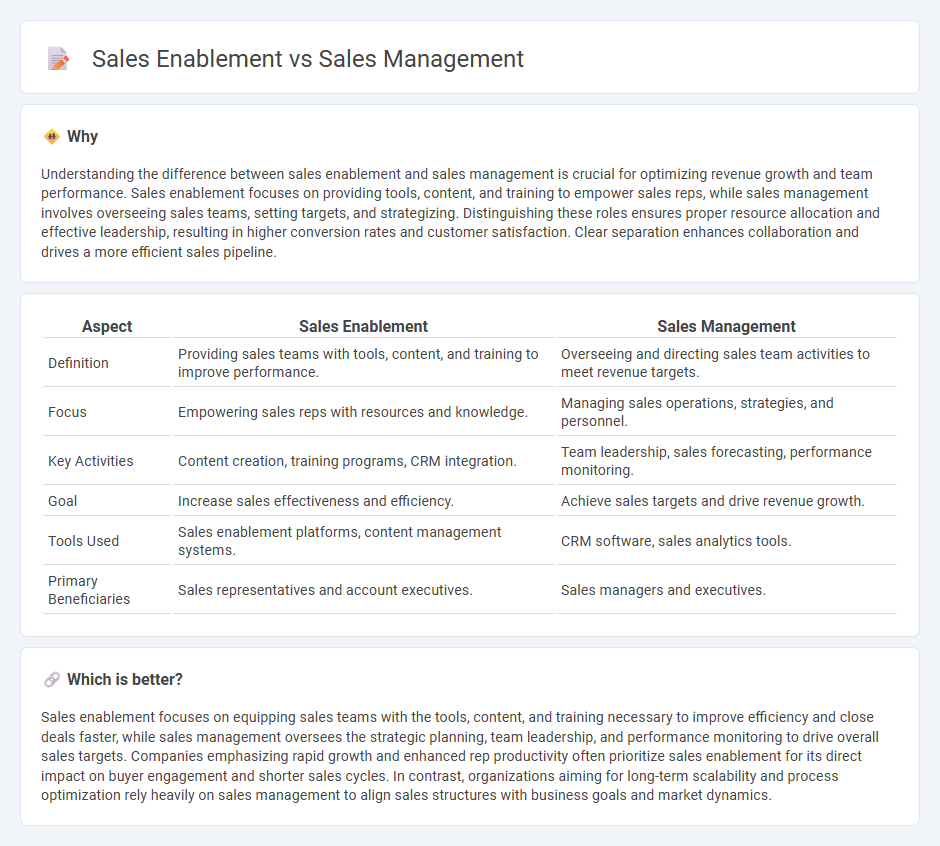
Sales enablement equips sales teams with the tools, content, and training necessary to engage buyers effectively and accelerate revenue growth. In contrast, sales management focuses on overseeing sales operations, setting targets, and driving team performance through coaching and strategy execution. Explore how aligning sales enablement and management can transform your sales outcomes.
Why it is important
Understanding the difference between sales enablement and sales management is crucial for optimizing revenue growth and team performance. Sales enablement focuses on providing tools, content, and training to empower sales reps, while sales management involves overseeing sales teams, setting targets, and strategizing. Distinguishing these roles ensures proper resource allocation and effective leadership, resulting in higher conversion rates and customer satisfaction. Clear separation enhances collaboration and drives a more efficient sales pipeline.
Comparison Table
| Aspect | Sales Enablement | Sales Management |
|---|---|---|
| Definition | Providing sales teams with tools, content, and training to improve performance. | Overseeing and directing sales team activities to meet revenue targets. |
| Focus | Empowering sales reps with resources and knowledge. | Managing sales operations, strategies, and personnel. |
| Key Activities | Content creation, training programs, CRM integration. | Team leadership, sales forecasting, performance monitoring. |
| Goal | Increase sales effectiveness and efficiency. | Achieve sales targets and drive revenue growth. |
| Tools Used | Sales enablement platforms, content management systems. | CRM software, sales analytics tools. |
| Primary Beneficiaries | Sales representatives and account executives. | Sales managers and executives. |
Which is better?
Sales enablement focuses on equipping sales teams with the tools, content, and training necessary to improve efficiency and close deals faster, while sales management oversees the strategic planning, team leadership, and performance monitoring to drive overall sales targets. Companies emphasizing rapid growth and enhanced rep productivity often prioritize sales enablement for its direct impact on buyer engagement and shorter sales cycles. In contrast, organizations aiming for long-term scalability and process optimization rely heavily on sales management to align sales structures with business goals and market dynamics.
Connection
Sales enablement provides sales teams with the tools, content, and training needed to improve efficiency and close rates, directly supporting sales management's goal of driving revenue growth. Sales management uses data from enablement initiatives to refine strategies, forecast performance, and coach sales representatives for higher productivity. This synergy ensures alignment between strategy execution and frontline sales effectiveness, maximizing overall business success.
Key Terms
**Sales Management:**
Sales management centers on overseeing and directing a sales team to meet revenue targets through strategic planning, performance tracking, and coaching. It involves pipeline management, setting quotas, forecasting sales, and ensuring alignment between sales operations and company goals. Discover how effective sales management drives organizational growth and enhances team productivity.
Quota
Sales management centers on setting and monitoring quota attainment, ensuring sales teams meet predefined targets through performance tracking and coaching. Sales enablement equips representatives with tools, content, and training designed to boost productivity and quota achievement by enhancing customer engagement. Explore how integrating sales enablement strategies can optimize quota performance for your team.
Sales Pipeline
Sales management concentrates on overseeing the entire sales pipeline, from lead generation to closing deals, ensuring targets are met through effective team coordination and performance tracking. Sales enablement equips sales teams with the necessary tools, content, and training to move prospects efficiently through the pipeline, enhancing conversion rates and shortening sales cycles. Explore how integrating sales management and enablement strategies optimizes pipeline velocity and boosts revenue outcomes.
Source and External Links
What is Sales Management? | DealHub - Sales management is the process of developing and implementing strategies to generate sales and achieve organizational goals, including setting sales targets, planning sales activities, and managing customer relationships to maximize team performance.
What Is Sales Management? | Salesforce US - Sales management involves organizing, motivating, and leading sales reps while tracking performance through hiring, goal-setting, coaching, and using metrics and KPIs to improve results.
What Is Sales Management: Definition, Scope, Objectives, Careers - Sales management is leading and aligning sales teams to meet objectives by setting goals, managing KPIs, forecasting sales, and facilitating communication between teams and leadership.
 dowidth.com
dowidth.com